REAWAKENING
In one of the bios for Deaf West’s production of Spring Awakening, actress Ali Stroker thanks the company for stepping out of the box, and turning what some may think as a ‘limitation’ into an opportunity. The “limitation” here refers to her wheelchair as well as deafness—particularly, her cast mates who are deaf appearing in a musical. Including the original production, this is my fourth time witnessing this 2006 musical phenomenon, and I still find it to be a problematic piece. Yet director Michael Arden and his amalgamated cast of 25 deaf, hard-of-hearing, and hearing actors have taken this limitation and turned it into the most heartfelt and spectacular production in memory. It is also one of the best offerings from Deaf West in its 24-year history.
Ironically, Sheldon Epp’s inept direction at Pasadena Playhouse of Kiss Me, Kate, which also opened last weekend, turned a perfect musical into a dispiritingly flat experience. Arden’s remarkably inventive staging at the Inner-City Arts’ Rosenthal Theater turns an imperfect musical into a rousing, emotional enchantment—an exceptional achievement not seen since Michael Matthews’ sterling 2012 version of the awful The Color Purple at the Celebration.
Told in American Sign Language, spoken English, and Brent Stewart’s wildly inventive supertitles, Spring Awakening concerns sexually blossoming German adolescents in the late 19th-century when parental discussion about the birds and the bees was verboten. At a boys’ preparatory school, Melchior is the intellectual rebel who isn’t buying into the religious or social mores; he even defends his friend Moritz, who anguishes over low grades and bullying by the schoolmaster. Schooled separately from the boys, Wendla is more intellectual and insightful than her schoolmates, longing to study and debate matters of substance, just as Melchior does. As their hormones are driving the teens to distraction, they are left to their own devices to deal with their feelings while suppressed by a Victorian society.
Steven Sater won a Tony for his issue-packed book, and I chalk that up to the choice dialogue from his source material, the far-superior 1892 German play by Frank Wedekind (which admittedly is well-spliced by Sater). But he also picked up another Tony for his esoteric, prosaic, pseudo-poetic, convoluted lyrics, packed with schizophrenic rhyming. While consistently amazed at the ingenious directorial touches, and raw, engaging performances, I actively listened to those lyrics more than ever, and still, many are so dense that my brain simply could not process them. Another problem with the impenetrable lyrics, however thematically universal, is that they are not character defining.
The characters tell each other their woes, but more often in musical asides, they tell us. Some confessions are the timeless stuff of all teenagers; others truly are tragic. The problem is that the characters are far more impressive when they are not narrating or annotating their situation. With heavy theme after heavy theme—and few of them explored deeply—there isn’t enough opportunity for any one of them to genuinely move us. As such, the work teeters on the edge of catharsis, but never takes us to the other side. One of the many impressive aspects of this production is that the palpable love in this company makes us care for characters who are sometimes hard to care for. (I was so entranced by the glory of magical theater last night that problems in book and lyrics were wholly forgivable.)
The scenes left fairly intact from Wedekind’s controversial three-act play still soar, more so in this production, which outshines any Spring Awakening which has come before. Particularly memorable is when the despondent Moritz (Daniel N. Durant, voiced by Rustin Cole Sailors) is happened upon by Ilse, a childhood friend whose chosen Bohemian lifestyle has its own share of grief. Surrounded by a bevy of impeccable thespians, the distinctive Lauren Patten nonetheless stands out as Ilse. In one scene, Patten embodies an array of emotions: frustration, love, neediness, desperation, joy, loneliness, and selflessness.
Fortunately for Sater, the coffee-house rock music is brilliantly orchestrated by composer Duncan Sheik; while occasionally overblown and inaccessible, the score contains some soul-searching melodies, and is haunting, raw, and driving. Arden and the equally innovative choreographer Spencer Liff seamlessly incorporate their actor/musicians (cello, harp, etc.) into the proceedings. Thus, Daniel David Stewart is rolled around playing piano as he acts out the voice of Ernst (Joshua Castille), a naïve and impressionable gay student seduced by the arrogant Hänschen (Joseph Haro). Likewise, the luminous Katie Boeck plays guitar as she supplies the voice to Wendla (a three-dimensional performance of vulnerability, inquisitiveness, and obedience by Sandra Mae Frank); a scene with them looking at each other in a mirror is a coup de théâtre. In fact, there are so many Story Theater-like brainchildren from Arden that you will never look at fireflies, masturbation, or trees in the same way again.
As with Rent, the success of Spring Awakening sprung from the universal chord it hit among younger audiences (keep the kiddies away). It’s liberating to see teen angst represented on stage. As in Wedekind’s play, the unfair, harsh, and misunderstanding adults are abusive teachers, obtuse parents (except one mother), and disengaged clergy. (All of the adults here are played by Troy Kotsur—voiced by Daniel Marmion—and Natacha Roi). The kids are, by turns, horny, curious, smart, vulnerable, lost, confused, poetic, gay, and suicidal. I wonder how I would have felt seeing this show at 17, and hearing two of the best songs of the night, “The Bitch of the Living” and “Totally Fucked.” I’m getting a woody just thinking about it.
As for Ali Stroker, the actress who spoke of “limitations”: The presence of this wheelchair-bound performer never felt gratuitous or inclusionary. When actors speak for those who sign, it’s an uncanny sensation because the voice seems to emanate from the signing actor’s hands. As she glided in and out of scenes, beautifully singing and acting as schoolgirl Anna, I could swear at one point I saw Ms. Stroker walking on legs. Miracles were everywhere in this reawakening of Spring Awakening.
photos by Tate Tullier
Spring Awakening
Deaf West Theatre
in association with The Forest of Arden
Rosenthal Theater
Inner-City Arts, 720 Kohler Street
Thurs – Sat at 8; Sun at 3
scheduled to end on November 9, 2014
for tickets, call (818) 762-2998 or visit www.deafwest.org
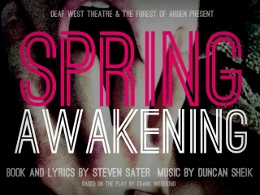
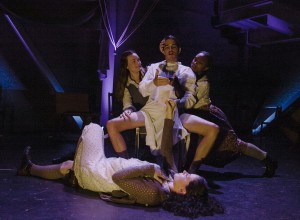
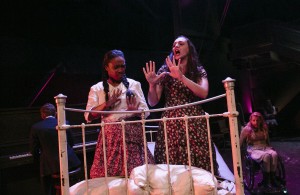
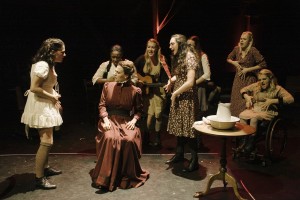
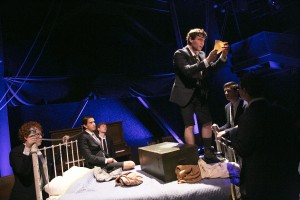
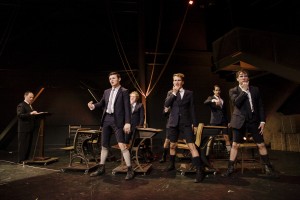
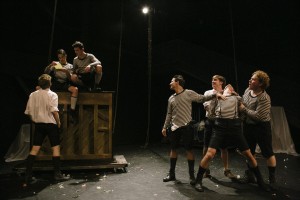
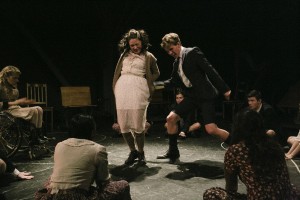

{ 3 comments… read them below or add one }
Tony, thanks for this comprehensive review. Few critics do your sort of research or present so passionate a view. And theatre (and reviewing) are dead sans passion. I’ve long been a fan of Deaf West. Thought their BIG RIVER to be a glorious revelation — and I’m hoping this new production will give me that same thrill. I’m buying my tickets to see SPRING AWAKENING tomorrow!
Follow up comment: Tony, in an effort to not conform to the traditional musical form, composer Duncan Sheik deliberately wrote songs that did NOT specifically address a character or plot point. This was by design as he stated in many interviews. Once it was decided that the play’s dialogue would be spoken in period English vocabulary and rhythms, Sheik knew that for his songs to “work” he’d have to totally break away from the spoken story and take us into a different, contemporary musical world. He was experimenting with time travel or sorts as the story is told in two vernaculars and exits on two distinct plains. FYI. CF
Thanks, Cris. I understand the intention; it’s the same as updating Shakespeare with contemporary music: Your Own Thing, based on Twelfth Night, and Two Gentlemen of Verona come to mind. I have little issue with Sheik’s music–it is the lyrics that are difficult to hear. Even if the intention was to write stand-alone, generic rock tunes different in tone from the libretto, these lyrics seem better suited for speaking at a poetry slam than singing.